The Pravdolyubov family, descendants of Holy Confessor Archpriest Sergiy PravdoliubovAll the priests in the town of Kasimov, including Fr. Sergiy, were arrested, taken to a forest, and ordered to dig a large trench near the railroad tracks. The clergy were convinced they were digging their own graves.
“>New Hieroconfessor Sergei Anatolievich Pravdolyubov, had a deep spiritual bond with Fr. John. The New Hieroconfessor Sergei, a representative of an ancient family of priests, had seven children. His two sons, Vladimir and Anatoly, became priests in the Diocese of Ryazan, where their ancestors had served for centuries. It was there in the early 1960s that they met the then Priest John Krestiankin, when he was beginning his ministry in the parishes of the land of Ryazan.
After Archpriests Anatoly and Vladimir Pravdolyubov, their mother Lidia Dmitrievna, the Hieroconfessor Sergei’s widow, and their sisters Vera and Sophia became acquainted with  Archimandrite John (Krestiankin)
Archimandrite John (Krestiankin)
“>Fr. John (Krestiankin). The younger generation of the family was drawn to Fr. John as well. So three generations of the Pravdolyubov family turned to Archimandrite John (Krestiankin) for advice. Among the descendants of Hieroconfessor Sergei who communicated with Fr. John were the famous Moscow Archpriests Mikhail Anatolievich and Sergei Anatolievich Pravdolyubov.
We offer our readers some stories about Fr. John (Krestiankin) related by some representatives of this wonderful family.
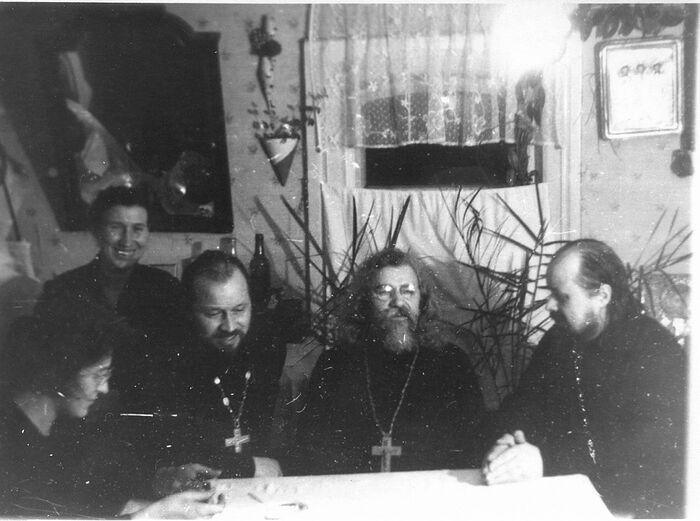 Fr. John visits Lydia Pravdolyubova
Fr. John visits Lydia Pravdolyubova
You can’t hide the sun with your hand!
Archpriest Vladimir Sergeyevich Pravdolyubov (1931–2021), son of Hieroconfessor Sergei. From 1967 to 2004 he was the rector, and until his death, the honorary rector of St. Nicholas Church in Kasimov.
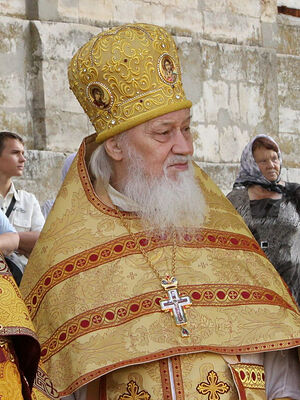 Archpriest Vladimir Pravdolyubov Before Fr. John’s arrival in the town of Kasimov in the Ryzan region, many people had already known about him as an extraordinary priest. These were the 1960s when Khrushchev’s persecution of the Orthodox Church was at its height. In Kasimov, a very domineering (especially in relation to the clergy) and intelligent woman, Claudia Ivanovna Potapova, worked at the church shop. So we lived as if under siege and expected all sorts of tricks from her. When the rector, Fr. Vasily, retired because of his advanced age, Claudia Ivanovna asked me:
Archpriest Vladimir Pravdolyubov Before Fr. John’s arrival in the town of Kasimov in the Ryzan region, many people had already known about him as an extraordinary priest. These were the 1960s when Khrushchev’s persecution of the Orthodox Church was at its height. In Kasimov, a very domineering (especially in relation to the clergy) and intelligent woman, Claudia Ivanovna Potapova, worked at the church shop. So we lived as if under siege and expected all sorts of tricks from her. When the rector, Fr. Vasily, retired because of his advanced age, Claudia Ivanovna asked me:
“Who is the best priest in our diocese? I’ll ask him to come to Kasimov.”
“Fr. John Krestiankin is the best, but they won’t send him to you.”
“They will send him here!” Claudia Ivanovna declared confidently.
Indeed, after a while we learned that Fr. John (Krestiankin) was being transferred to Kasimov.
Then Claudia Ivanovna got a little scared:
“They say batiushka is clairvoyant?”
During his stay in Kasimov—and he served there from January 30 (the feast of the Three Holy Hierarchs according to the old calendar) 1966 to February 2 (the Meeting of the Lord according to the old calendar) 1967—Fr. John renovated the church inside and outside, and the nuns from Letovo sewed vestments of the missing colors.1 These vestments still exist and are called “Fr. John’s vestments”. His spiritual children from Moscow brought fresh flowers for the burial shroud of the Lord. Since then and to this day this custom has been kept at the churches of Kasimov: to adorn the burial shrouds with fresh flowers.
Despite his previous term in prison, Fr. John acted without regard for the authorities and preached very boldly. I remember phrases about militant atheists from his sermon:
Once I was hearing confessions during the late Liturgy. One of those who confessed was a woman who had had an abortion. Although she promised that she would not repeat this sin, I had doubts that she sincerely felt the severity of her fall. No sooner had I thought about it than I heard Fr. John’s sermon thundering: “The chalice with the blood of a murdered baby will be given to a mother-murderer to drink!”
After graduating from the academy, a priest had nowhere to serve for a while and practiced in Kasimov. Once, during the late Liturgy, he was performing the sacrament of Baptism in the caretaker’s room. Suddenly he ran out agitated:
“Fr. Vladimir, what should I do? The godmother has turned out to be an unbeliever! She came during the Baptism, and I had not asked her about her faith before the Baptism.”
I followed him to the caretaker’s room and saw a young woman trying not to lose her dignity, but who was clearly confused, and next to her was an angry young priest railing at her:
“How dare you—an unbeliever!—come to the sacrament of Baptism, and even become a godmother?!”
Stunned by such an attack, the woman tried to justify herself with official arguments of anti-religious propaganda. In a few words I proved to her the absurdity of her claims and silenced her. Worried over our absence, Fr. John came to the caretaker’s room, got into the matter, realized that both his counterparts had attacked the woman to the point of exhaustion, took her aside and started whispering something in her ear. From what we heard it became clear that he was telling her that she was actually a believer, but she didn’t know it yet.
I was struck by his extraordinary prayer
Vera Sergeyevna Pravdolyubova, daughter of the Hieroconfessor Sergei. She suffered from deafness and never married. After the death of her mother, Lidia Dmitrievna, she lived with her sister Sophia Sergeyevna.
Having arrived in Kasimov, Fr. John behaved with us so simply, as if he were our relative, that he began to come to our place. After some trip he would call the two brothers Fr. Anatoly and Fr. Vladimir to go to our place together. He would say, “Let’s go together to our Mother’s.” And he would say to our mother about himself: “Here is your third son, Mom.” And he talked a lot with his brother-priests at the table.
On learning about my deafness, Fr. John allowed me to take books to church and follow the service, reading it simultaneously. He gave me a tattered Festal Menaion in a rather small format. I could take several sheets with me to services rather than the whole book. My life became easier at once. To this day I haven’t learned how to pray for two or three hours in a row without books. Before Fr. John, I had not been allowed to take books to church and read at the services. The books still serve me and comfort me greatly.
Once they were talking about me at the table. Fr. John said:
“I should marry you off.”
“What are you talking about! I’m old!”
“There can be a ‘white,’ or a ‘black’ marriage.”
Having no inclination for monastic life, even though I was a spinster, I began to refuse, scared. (What if he blesses me for this! What will I do?) The conversations at the head of the table went on, while I was sitting there and (woe to me!!!) thinking: “Black marriage! And what’s he like? Neither ‘black’, nor ‘white’—he is sort of gray!”2 And almost immediately, in response to my thoughts, Fr. John uttered:
“Be like me for now—gray.”
And then he repeated it to my sister Sophia:
“Maybe she didn’t hear—let her be gray for now.”
And I’ve remained “gray” to this day.
I also have a very strong and vivid recollection. I would stand among people at the church as I did not hear any services or sermons because of my deafness. Once, during the reading of the Akathist before of the wonderworking Kazan Icon of the Mother of God, I found myself not far from Fr. John. And I was struck by the extraordinariness of his prayer—it was so fervent. This is how Fr. John prayed; it pierced my whole soul and ignited prayer for me.
One day I told Fr. John:
“I prepare and write my confessions for hours, but as a result I have fiction.”
He answered:
“If we don’t have a lump of gold, then we are happy that we have at least some grains.”
I said:
“I’m weeping and weeping. How good it would be if these tears could be turned into tears for my sins! But I’ve shed so many of them for nothing.”
Fr. John replied:
“When we don’t have clean water, we take what we have, let it settle, filter it, and purify it as best we can. Won’t God be able to filter your tears to get the tears for your sins?”
We must be, not seem
Sophia Sergeyevna Pravdolyubova, a daughter of the Hieroconfessor Sergei. She was very ill, and doctors predicted her imminent death several times. She lived to a very old age, but did not marry. In her final years she cared for her seriously sick sister Vera Sergeyevna.
I cannot pass over in silence a miracle that occurred to our elder brother, Fr. Anatoly, through the word and prayer of Fr. John. After a massive heart attack, Fr. Anatoly could no longer serve and began to get more and more ill.
Fr. Anatoly performed the wedding ceremony for all of his children himself. At that time, only the youngest, Seraphim, was single. And Fr. John blessed Fr. Anatoly to perform the wedding ceremony for his youngest son himself. We hoped that Fr. John’s prayers would make Fr. Anatoly feel better, and he would be able to do it. But as time went by, not only did he not get better, he got worse and worse. The wedding was scheduled for late January, and before the feast of the Protection of the Mother of God Fr. Anatoly was doing very poorly. But he was still alive.
Fr. Anatoly firmly believed, and said more than once that Fr. John’s blessing would surely be fulfilled, and he would certainly marry Seraphim himself. His condition was such that he was not able to perform the service, but nevertheless we began to prepare for the wedding. However, he was getting worse again, and on the eve of the wedding he felt very bad. I was by his side and heard him repeat over and again: “5 Mezhdunarodnaya Street, 5 Mezhdunarodnaya Street”—this is the address of the Pskov-Caves Monastery. Soon Fr. Fyodor, his son, came to him. I went into another room where I had to decorate the cakes. As I was decorating them, tears were flowing down my face. The night passed.
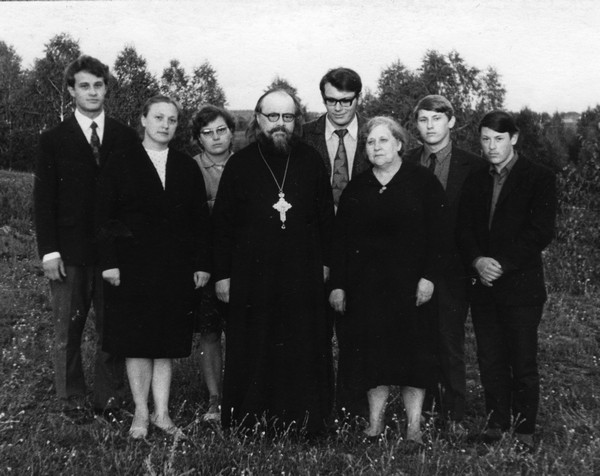 Fr. Anatoly Pravdolyubov with his children
Fr. Anatoly Pravdolyubov with his children
The time came, and will difficulty we dressed Fr. Anatoly. We drove the car to the porch and it took us twenty minutes to seat him in it. People gathered at the church, but there was no wedding excitement; rather, sadness reigned in the air. Everyone was aware that they were seeing their batiushka for the last time. Fr. Fyodor betrothed the newlyweds, and Fr. Anatoly crowned them. Our second brother, Fr. Vladimir, stood in the small altar and prayed incessantly. Everything went well. But the miracle continued! Fr. Anatoly was able to sit at the table with the newlyweds and even sing something!
Our sister Vera was worried that he might die after the wedding, and the newlyweds’ festivity would turn into mourning. But Fr. Anatoly lived for three more weeks, and in accordance with the words of Fr. John: “And then you can say, ‘Lord, now lettest Thou Thy servant depart in peace,’ he passed away on the second day of the feast of the Meeting of the Lord.
When afterwards I thanked Fr. John for this miracle with Fr. Anatoly, he said, “It’s also his great faith.”
I want to recall Fr. John’s important words:
-
“We must be, not seem.”
-
“If we know something, we can teach others. Then we must fulfil it!”
We must endure to the end
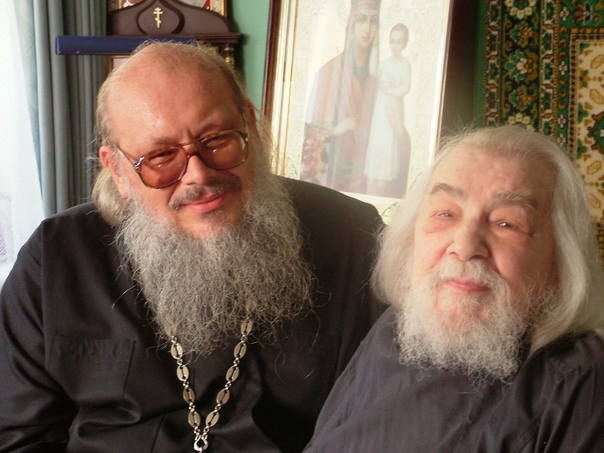 Archpriest Sergei Pravdolyubov with Fr. John
Archpriest Sergei Pravdolyubov with Fr. John
Archpriest Sergei PravdoliubovPravdoliubov, Sergei, Archpriest
“>Archpriest Sergei Anatolievich Pravdolyubov (1950–2024), grandson and full namesake of the Hieroconfessor Sergei. From 1990 to 2024 he served as the rector of the Holy Trinity Church in Troitskoye-Golenishchevo in Moscow, a Master of theology, a writer:
I will never tire of repeating batiushka’s words: “There is not a single person who is equal to another in everything. I’ve lived my whole life and never seen two identical people with similar lives.”
For me these words have been proven in practice more than once.
Many people went through our kitchen in Moscow. They would go to the elder in sorrow and trouble and stop overnight with us on the way. Most of them were our numerous relatives. Sitting over a cup of tea and listening to suffering souls, we would begin to imagine together with the travelers what the elder might say. We would start analyzing, weighing up, constructing, guessing, and “predicting” it in detail. A few days later the travelers would return elated and inspired. I would ask them: “How are things?!” And it would turn out that the elder had decided in an absolutely different way! Regardless of how much we had thought—we never guessed anything. Sometimes the elder made the opposite decision. Once I even joked:
“Why travel so far? Ask me what should be done—and do the opposite!”
In the 1980s in Pechory, when I was present during conversations with the elder, I noticed that he would say the same thing much more often than before:
“Patience and more patience. Just patience. We must endure to the end.”
I was even confused; after all, there are limits to patience. And what if you can’t endure anymore?
I got wonderful edification from my brother Fr. Mikhail’s trip to Pechory. He and I served as deacons in Moscow, and we had no hope of becoming priests. A few years earlier, Fr. John had blessed another brother of mine, Fr. Seraphim, to go and serve in the Ryazan Diocese. So Fr. Mikhail intended to leave and become a priest in our “native” diocese too. Metropolitan Simon (Novikov) of Ryazan and Kasimov (1972–2003) even offered Fr. Mikhail a church to which he would assign him. All that remained was to receive the elder’s blessing.
My brother called me and said that he was going to get his blessing to leave Moscow. Following the logic of the previous brother’s blessing, I even felt sad—three brothers would be there, and I alone would stay in Moscow. I had absolutely no doubt that the blessing would be received.
But my brother came back and astonished me—there was no blessing! “How can it be?!” I thought
The elder said:
“You want to burden yourself with a new self-made cross on your own initiative? You can do that, but having replaced the cross given to you by God, you won’t receive His support anymore when you weaken, and then you will fall under the weight of this cross. Be patient and bear the cross that was given to you. Let two brothers serve in the Ryazan Diocese, and two brothers in Moscow.”
Many years later, when Fr. Mikhail’s son had grown up, we vividly remembered this blessing again. “Is it worth bothering so much for his ordination, parish, or a good position?” No need! The principle here is to learn to understand and accept the will of God. And the Lord Himself will arrange everything by His Providence.
Take heart and don’t fear!
Archpriest Mikhail Anatolievich Pravdolyubov (1953–2017), grandson of Hieroconfessor Sergei. From 1979 he served as a deacon, in 1990 he was ordained priest and appointed a cleric of the Church of the Resurrection of Christ in Sokolniki in Moscow, where he served for twenty-seven years until his death.
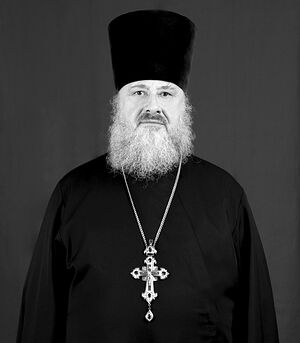 Archpriest Mikhail Pravdolyubov Whenever I visited the Pskov-Caves Monastery, I often heard Fr. John talking to people—there were very interesting conversations.
Archpriest Mikhail Pravdolyubov Whenever I visited the Pskov-Caves Monastery, I often heard Fr. John talking to people—there were very interesting conversations.
One of the priests once asked Fr. John if the Chernobyl disaster could be considered apocalyptic and if Chernobyl was the very “star of Wormwood” mentioned in the Revelation (Rev. 8:11)?
“I would not flatly call the accident at the nuclear power plant a direct fulfillment of the Apocalypse,” Fr. John replied. “We must be very cautious when interpreting the Apocalypse, and it is not without reason that the Church does not accept many of its interpretations. There are commentaries on the Book of Revelations by St. Andrew of Caesarea—they are accepted by the Church and can be read. The others are very dubious!”
Around the same time, in the mid-1980s, the first disturbance concerning personal identification numbers began. Back then these were still not Taxpayer Personal Identification Numbers (INN), but new pension documents. People were required to fill out some forms and enter a certain number. Some believers started talking about the “seal of the antichrist” and the supposed inadmissibility of filling out such forms. I was constantly asked what the attitude of Orthodox towards it should be. I believed there was nothing special about it, but I wanted to know Fr. John’s opinion. On one of my trips to Pechory I explained in detail to Fr. John everything that was confusing people. Fr. John personally replied to me that the faithful should not be afraid of any numbers. Numbers are everywhere: on the clock, on documents, on the pages of books, and so on! Why be afraid of them? It is not numbers that we must fear, but the sins that we commit, especially the temptations of the end times.3 If we easily succumb to these temptations, if we sin easily, then the spirit of the antichrist is already working in us, and imperceptibly for us the seal of the antichrist, which everyone is so afraid of, may already be on us!
I also asked Fr. John about the priesthood: How should we deal with the acute problem that was arising in many parishes everywhere—the problem when priests consider themselves entitled to keep their parishioners tied to them and forbid them to go to confession to another priest? Fr. John replied as follows:
“Everything that makes up a person—reason, will, conscience, and spiritual freedom—should never be violated. If it is disrupted, disease begins. As the Gospel says: Christ healed the blind, the deaf, the lame, the lepers… [Fr. John paused and looked straight into my eyes] and the possessed. Yes, this is a disease too, a spiritual one. And the onset of this disease is when a person loses his own will, subordinating it to the will of another person. Then conscience is hardly able to say anything to him—it is drowned out as a result of shirking a one’s own responsibility before God and placing it on someone else.”
In the late 1980s, Fr. John referred to our times as those of bloodless martyrdom.
“You are bloodless martyrs,” he used to say. “And later it will be even harder. Your time is harder than ours, and I can only sympathize with you. But take heart and don’t fear! Now there is confusion, turmoil and mix-ups everywhere, and it will get even worse: perestroika, then roll calls, then shooting. There will come a period of severe spiritual hunger, although there will be plenty of food on on the table.”
His soul was big enough for everybody
Lydia Anatolievna Pravdolyubova, grand-daughter of Hieroconfessor Sergei. A singer and a choir director, for many years she had obediences at the Church of the Theophany of the former Theophany Monastery in Kitai-gorod, Moscow.
Fr. John was loved and venerated. Even then, in the 1960s, many people flocked to him from everywhere with their sorrows and miseries. They came at any time day or night. He received everybody, despite his poor health and lack of free time. We marveled how he managed to find enough energy.
Resolving someone’s perplexity, he used to say:
“A wise man was asked three questions: What is the most important time in our life? Who is the most important person in our life? What is the most important thing to do? The answer was as follows: The most important time in life is the present moment, because the past has gone and the future has not yet come. The most important person in life is the one who is in front of you now and to whom you can do either good or evil. The most important thing in life is to give everything that can be given to the person in front of you at this very moment.”
This is what Fr. John did all his life.
In Kasimov, all important events and all Church issues were discussed and resolved by the “council” of priests. At that time, everyone would gather in the house: my grandmother— Hieroconfessor Sergei’s widow, with my father’s sisters (Aunt Vera and Aunt Sophia), Fr. Vladimir and his family, and my father, Fr. Anatoly, with our mother—and sometimes we, their children, with them. Fr. John used to say, “We have one soul.” He called my grandmother “Matushka”, and called my father jokingly and lovingly, “an indispensable member of the Synod.” We, the children, were present at the “Synod meetings”, watched and listened to their conversations quietly. These were big, highly informative conversations that enthralled us children. We listened, watched and absorbed everything, trying to understand the greatest event for us—Fr. John.
Fr. John was full of love, his soul was large enough for everybody, and he was always bright and joyful. But he was at the same time always extremely collected and inwardly strict. It was as if he always possessed knowledge of higher spheres inaccessible to us, as if he always reverently and carefully abode in them, while remaining attentive and sincerely open. He heard these spheres continuously—he was all hearing. He was afraid of disturbing this state of hearing with anything, and he compared all his actions with this state. He “walked before God”.
Once my sister Elena and I were at the Sunday Vigil at the monastery, which was celebrated by Fr. John. It is difficult to describe the state that we experienced at that service. Fr. John came to the litiya as the officiating priest and he stood in the center this way—in a mantiya, a klobuk, and, by custom, raising his head slightly (like a sensitive “radar”, he would face the heavens, the Source, as if he were so aimed and directed towards It that it was hard for him to stay on earth). His hand was on his chest, as if he carefully and reverently, with awe, were keeping the precious vessel of his heart—the receptacle and abode of the Holy Spirit. This time his face was so strict, focused, and expressed such self-absorption, presence, and mystery that it was scary to look at him. Because it seemed that what Fr. John so longed for with all his heart, what he was turned towards by all his love, what “sucked” him up from the earth—even in external manifestations—was present here. Fr. John seemed to be a co-partaker in a mystery. He was standing in front of Someone and with Someone. He wasn’t directed anywhere anymore—everything was already here. We felt fearful. We were aware of the extraordinariness of the moment and rejoiced with awe that this element of Heaven had touched our souls—the one in which Fr. John already lived and performed his ministry.
I would also like to add that Fr. John was a participant in the mysterious life of the heart. He saw the heart through the power of God, guiding it by the power of God. His cell was an “x-ray room”. And also, as Fr. John joked, the only “forced air (artificial ventilation) room”. You could even say “ICU”. A place where you were brought back to life and “spread your wings”. And not only his cell; there are no barriers for people of God. They know your heart always and everywhere.









